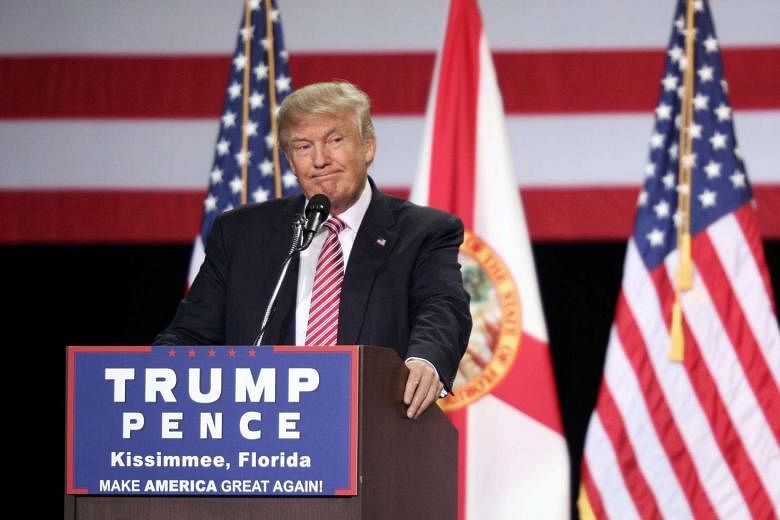ORLANDO (Reuters) - Republican presidential nominee Donald Trump has briefly set aside his self-confidence for a rare display of doubt, acknowledging on Thursday (Aug 11) that his campaign was struggling in Utah, a usually rock-solid Republican state, and the possibility he could be defeated on Election Day.
The wealthy New York businessman made the comments after suffering a number of self-inflicted wounds in recent days that have given the advantage in the campaign to Democrat Hillary Clinton.
"We're having a tremendous problem in Utah," Trump told a conference room filled with evangelical pastors, blaming a"false narrative" that has been built up around his candidacy. He has repeatedly blamed the news media for dishonest tactics.
A SurveyUSA opinion poll conducted for the Salt Lake Tribune in June showed Clinton and Trump tied. Other polls have given Trump a lead but not the type of advantage that previous Republican nominees have enjoyed in the state.
The normally confident Trump never apologises and is loathe to admit that he might face difficulties. But in talking to the National Association of Home Builders earlier in Miami Beach, Trump admitted his past years before he became a politician could be causing him problems now.
"If I had planned for it, I wouldn't have had such a rocky path," he said. "I wouldn't have spoken to Howard so much."
That was a reference to his many appearances on the "Howard Stern Show" radio program. He has been estimated to have appeared on the show more than two dozen times over 20 years, and the conversation frequently turned ribald.
And in interviews on Thursday morning, he sounded an uncharacteristically fatalistic note, acknowledging the possibility he could be defeated on Election Day.
Trump pledged on CNBC to "just keep doing the same thing I'm doing right now," adding that he was the only presidential candidate who tells things "straight" and is "a truth-teller", the New York Times reported.
"At the end, it's either going to work or I'm going to, you know, I'm going to have a very, very nice long vacation," he added.
Trump, who is trailing Clinton in Virginia, a formerly Republican state that Democratic President Barack Obama won in 2008 and 2012, urged evangelicals to help him in that state as well.
In doing so, Trump pledged to rewrite the so-called Johnson Amendment, the 1954 change in the US tax code that prohibits church leaders from using the pulpit for political purposes.
"If we get those people to vote, we're going to win in Virginia," he said. "If they don't vote, it's not going to happen." Trump also said "we need help in Ohio," the state where he held his Republican National Convention last month.
Ohio Governor John Kasich, who lost to Trump in the Republican primary race, has refused to endorse Trump. "We're very close in Ohio, but we need help," Trump said.
Trump has seen a steady stream of moderate Republicans vow not to support him, such as US Senator Susan Collins of Maine, and 50 Republican national security experts signed a letter opposing him.
All this is evidence of fissures in the party over the bellicose rhetoric and positions of Trump, who on Wednesday called Obama "the founder of ISIS," the acronym for Islamic State, and Clinton "the co-founder."
Trump joked that winning the White House and doing a good job as president might be his only way to salvation.
"So go out and spread the words and once I get in, I will do the thing that I do very well," said Trump with a smile. "I figure it's probably maybe the only way I'm going to get to heaven, so I better do a good job."

